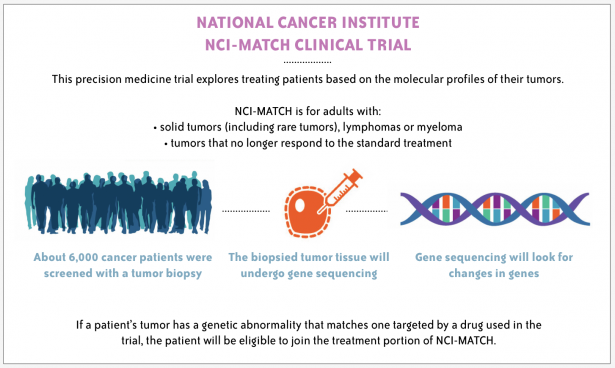Mix-and-match trial is actually precision medicine
May 30, 2017 | Tom Wilemon

Illustration by Rafael Lopez
A clinical trial that gives drugs for one type of cancer to patients with another type of cancer may seem like a mix-and-match approach, but it’s actually a highly focused precision medicine initiative.
The NCI-Molecular Analysis for Therapy Choice (NCI-MATCH) trial assigns drugs according to the genetic abnormalities of cancer cells instead of the organ where the cancer originates. It aims to identify new treatments for patients who otherwise might be running out of options.
Vanderbilt-Ingram Cancer Center (VICC) has screened adult patients with advanced solid tumors, lymphomas and myelomas that are no longer responding to standard therapies for this trial.
“If we can find common weaknesses across cancer types and target each of those weaknesses individually, it may be better to actually do that and, thus, exploit those common vulnerabilities, regardless of whether it is breast cancer, melanoma, lung cancer or colon cancer,” said Douglas Johnson, M.D., MSCI.
To qualify for the clinical trial, adult patients must have cancers with one of a series of targeted genetic abnormalities. The drugs in this large and transformative precision medicine trial target those mutations.
Johnson is the national lead investigator for one arm of the trial that is linked to the BRAF mutation. Patients who qualify for this arm will receive trametinib, a melanoma drug, even though they don’t have the skin cancer.

One of the goals of the trial is to recruit patients who have rare cancers. Examples of rare cancers are those that originate in organs where tumors don’t commonly occur, such as the gallbladder and pituitary gland. Rare cancers are often called “orphan cancers” because their prevalence is not large enough to recruit the required numbers of participants for traditional phase III clinical trials.
A cancer can also be considered an orphan disease even though it originates in an organ where cancer is common, if its molecular profile is rare, said Carlos L. Arteaga, M.D., Donna S. Hall Professor of Breast Cancer and director of the VICC Center for Cancer Targeted Therapies and Breast Cancer Program. Arteaga is also a member of the national steering committee for NCI-MATCH.
The trial specifically analyzes tumors for genetic abnormalities, but it does not test genes in the inherited or so-called germline DNA, which is an important distinction, Arteaga said, noting that patients sometimes misunderstand the process.
The National Cancer Institute (NCI) covered the cost of the biopsy and molecular tests. Patients will receive the drugs without charge if they are eligible to enroll for an NCI-MATCH treatment.
Several of the drugs in the NCI-MATCH trial are already standard treatments for lung and breast cancer and melanoma.
“Lung cancer and melanoma are probably your best examples of what precision medicine treats, probably more so lung cancer than melanoma,” said Leora Horn, M.D., M.Sc., clinical director of the VICC Thoracic Oncology Program.
Ensartinib, a precision medicine therapy initially tested and validated at a VICC laboratory, is one of the drugs on the list for NCI Pediatric MATCH, she said, but complete details about that trial have yet to be released.
The NCI aims to launch a similar pediatric trial later this year. Monroe Carell Jr. Children’s Hospital at Vanderbilt will take part as a participating institution in the NCI-funded Children’s Oncology Group.
Teresa Knoop, M.S.N., AOCN, clinical nurse specialist, said VICC has added a staff member to guide patients through the MATCH process.
“We have something unique at Vanderbilt in that we have hired a person who attends strictly to the MATCH trial,” Knoop said. “If a physician identifies a patient who might qualify, she begins the interaction with the patient, consents the patient and follows through with the patient until we find out if there is a definite match.”
The MATCH trials are part of the National Institutes of Health Precision Medicine Initiative, which revolves around an approach to disease prevention and treatment that takes into account individual differences in people’s genes, environments, and lifestyles. Precision medicine gives clinicians tools to better understand the complex mechanisms underlying a patient’s health, disease, or condition, and to better predict which treatments will be most effective.
Physicians and patients can learn more about cancer clinical trials at Vanderbilt by visiting vicc.org or dialing 1-800-811-8480.
